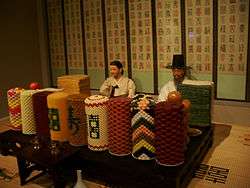Hwangab
Hwangab (Hangul: 환갑; Hanja: 還甲) in Korean, Kanreki (還暦/かんれき) in Japanese or Jiazi (甲子) in Chinese, is a traditional way of celebrating one's 60th birthday in East Asia. The number 60 means accomplishing one big circle and starting another one in one's life as the traditional 60 year calendar cycle of the lunar calendar.
In the past, a person's average life expectancy was much lower than 60, so the Hwangab also meant a celebration of longevity. The celebration party is also a wish for an even longer and more prosperous life. This party is customarily thrown by the children of the one who is turning 60, unless that person does not have any children, in which case there's no party at all. On one's Hwangab, family and relatives prepare a big birthday celebration with lots of food.
With the increasingly longer life spans of people these days, the Hwangab celebration has been given a lesser significance than before; typically, only close family members get together to have a big meal.[1] Many Koreans now take trips with their families instead of having a big party to celebrate their 60th birthdays. Parties are also thrown when a person reaches 70 (called Gohi or Chilsun) or 80 (Palsun) years of age.

Gobaesang, table set for hwangap
See also
- Dol-janchi, the one year birthday celebration in eastern Asian countries
- Janchi
References
- ↑ Hyong, Kie-joo (2005). Korea Today. Yoon Deok-hong. p. 70.
